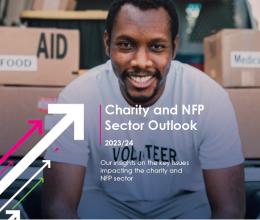Charities are required to prepare their statutory accounts in accordance with the Charities Statement of Recommended Practice (Charities SORP), which is underpinned by Financial Reporting Standard 102 (FRS102).
The Financial Reporting Exposure Draft (FRED) 82 proposes a number of changes to FRS102 as a result of the second periodic review of the Standard.
What changes can charities and non-profit entities expect?
Although there are amendments to almost all of the sections of FRS102 in one form or another, there are two major changes which will impact all entities, including charities and non-profits:
Income recognition
Under current UK GAAP, there are three general principles to income recognition. Under the revised FRS102, recognition of income will follow a five step approach which is more closely linked to IFRS 15 ‘Revenue from contracts with customers’.
- Identify the contract with a customer
- Identify the promises within the contract
- Determine the transaction price
- Allocate the transaction price to the promises in the contract
- Recognise revenue when (or as) the entity satisfies a promise.
The language used in the above steps – which comes directly from FRED 82 – is not the sort of language we tend to use in the third sector. This is where the Charities SORP drafting committee will come into their own, making the provisions of the new standard more reader friendly for those working within the sector, rather than being aimed at accounting professionals.
Charities have a number of different income streams and whether you are affected or not will be determined by what your charity’s income streams are.
For example, let’s look at donations and other fundraising voluntary income. Voluntary income is freely given and is not generally recognised until it is received. This is because the condition of entitlement is not considered to exist until monies have changed hands. This source of income is unlikely to be impacted.
The amendment to the approach to income recognition is more likely to impact charities that receive legacy income and grant income. Whether that be general grant income which would usually be classed as donations, but might be for a specific purpose, or those which have performance related conditions attached to them.
Leases
Under current UK GAAP, a charity’s operating lease commitments are ‘off Balance-Sheet’ and are simply a disclosure note, usually somewhere towards the end of the statutory accounts. When FRS102 was first introduced back in 2015, this disclosure note was amended to record all an entity’s commitments under the term of the lease.
This revised FRS102 takes that change one step further, bringing the liability onto the Balance Sheet. For those of us who are professional advisers, this change has been widely anticipated for some time and is in-line with changes made to the recognition of other liabilities, such as multi-employer pension schemes where, if a charity is able to separately identify their share, the liability is now recognised on the Balance Sheet.
This change will have an impact on a charity’s net assets.
When does the updated standard become effective?
It is proposed by the FRC that the revised standard will become effective for accounting periods beginning on or after 1 January 2025. Early adoption is permitted providing all amendments contained in the standard are applied at the same time. It is expected that there will be transitional provisions included in the standard, just as there were when FRS102 was originally published in 2015.
The next step
Whether you think you will or will not be affected by the proposed amendments to financial reporting, your local UHY adviser will be happy to discuss the implications with you well ahead of 1 January 2025 to give you certainty and peace of mind over your accounts and audit timelines.
What else is happening in the sector?
Download our 2023/24 Charity and NFP Outlook and turn to page 9 to read the article in full, plus much more. From our insights on the key issues impacting the sector to top tips about how to safeguard your organisation and updates on the latest regulatory issues, we examine what you can do to ensure your charity is prepared for the future.




